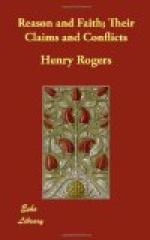One would imagine—perhaps not untruly—that the Divine Creator had subjected us to these difficulties—and especially that incomprehensible trilemma,—that there is an union and interaction of two totally distinct substances, or that matter is but thought, or that thought is but matter,—one of which must be true, and all of which approach as near to the mutual contradictions as can well be conceived,—for the very purpose of rebuking the presumption of man, and of teaching him humility; that He had left these obscurities at the very threshold—nay, within the very mansion of the mind itself,—for the express purpose of deterring man from playing the dogmatising fool when he looked abroad. Yet, in spite of his raggedness and poverty at home, no sooner does man look out of his dusky dwelling, than, like Goldsmith’s little Beau, who, in his garret up five pair of stairs, boasts of his friendship with lords, he is apt to assume airs of magnificence, and, glancing at the infinite through his little eye-glass, to affect an intimate acquaintance with the most respectable secrets of the universe!
It is undeniable, then, that the perplexities which uniformly puzzle man in the physical world, and even in the little world of his own mind, when he passes a certain limit, are just as unmanageable as those found in the moral constitution and government of the universe, or in the disclosures of the volume Revelation. In both we find abundance of inexplicable difficulties sometimes arising from our absolute ignorance, and perhaps quite as often from our partial knowledge. These difficulties are probably left on the pages of both volumes for some of the same reasons; many of them, it may be, because even the commentary of the Creator himself could not render them plain to finite understanding, though a necessary and salutary exercise of our humility may be involved in their reception; others, if not purely (which seems not probable) yet partly for the sake of exercising and training that humility, as an essential part of the education of a child; others, surmountable, indeed, in the progress of knowledge and by prolonged effort of the human intellect, may be designed to stimulate that intellect to strenuous action and healthy effort—as well as to supply, in their solution, as time rolls on, an ever-accumulating mass of proofs of the profundity of the wisdom which has so far anticipated all the wisdom of man; and of the divine origin of both the great books which he is privileged to study as a pupil, and even to illustrate as a commentator,—but the text of which he cannot alter.




